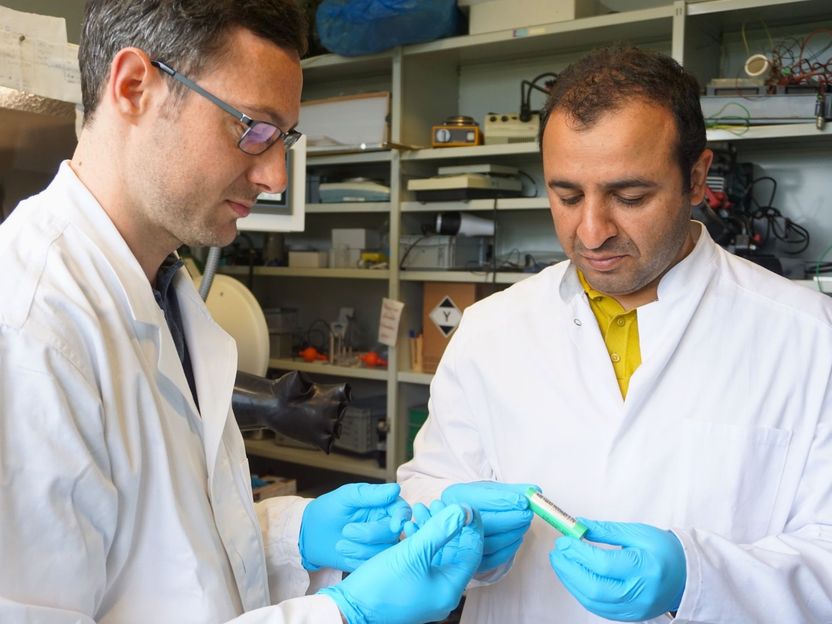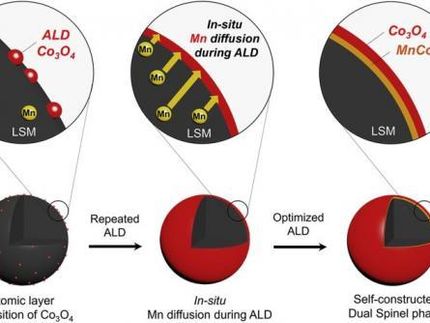From 0 to 100 in 12 minutes: timetable for lithium-sulphur batteries
International study shows potential of fast-charging lithium-sulphur batteries for e-mobility and the energy transition
Advertisement
Pick up a coffee once and the car is fully charged - this is how many people imagine the mobility of the future. But today's batteries are still a long way off. Although modern lithium-ion batteries charge from 20 to 80 percent in around 20 to 30 minutes, a full charge takes considerably longer - and fast charging puts a lot of strain on the cells.

Jakob Offermann (left) and Dr. Mozaffar Abdollahifar (right) with a lithium-ion battery.
© Christina Anders, Uni Kiel
A new international review study in the journal "Advanced Energy Materials" now shows how lithium-sulphur batteries (LSBs) could overcome these limitations. Researchers from Germany, India and Taiwan - coordinated by Dr. Mozaffar Abdollahifar from Professor Rainer Adelung's group at Kiel University (CAU) - have systematically analyzed hundreds of current studies and have shown which mechanisms can be used to operate LSBs stably and efficiently, even at high charging speeds. Their goal: charging times of less than 30 minutes - ideally even just twelve minutes - with higher energy density and greater range.
Lithium-sulphur batteries: More range, faster charging
LSBs are regarded as promising successors to the established lithium-ion batteries. In the latter, lithium ions are stored in and removed from solid electrode materials, while in LSBs chemical reactions take place in which new compounds are formed. A metallic lithium anode is used in combination with a sulphur cathode, which theoretically results in a capacity of 2600 watt hours per kilogram - around ten times as much as conventional systems. In future, e-vehicles could therefore cover significantly longer distances on a single charge.
Another advantage: sulphur is inexpensive, globally available, environmentally friendly and non-toxic - there are also many economic arguments in favor of switching to sulphur as a cathode material.
Technical challenges of LSB technology
So far, however, there have been technical hurdles to widespread use: sulphur is an electrical insulator and must be combined with conductive additives - which increases the battery weight. The cathode expands by up to 80 percent during charging and discharging, which can impair mechanical stability and service life.
Added to this is the "shuttle effect": during discharge, soluble lithium polysulphides are formed which migrate to the anode and cause undesirable side reactions there - with negative consequences for efficiency and stability. "In addition, dendrites - needle-like structures - can grow on the lithium metal anode, which can trigger short circuits and, in the worst case, cause fires," explains first author Jakob Offermann.
Strategies for fast charging with high safety
The study specifically examines work with particularly fast charging times (from 2C, i.e. charging in less than 30 minutes) and high sulphur loading - both of which are crucial for practical applications. Important solution approaches are:
- Cathode design: conductive carbon structures, such as nanotubes, graphene or activated carbon improve ion transport and sulphur utilization - even with high material loading. Defect-rich and doped carbons also help to reduce the shuttle effect.
- Catalytic materials: Metal oxides, chalcogenides or single atom catalysts accelerate the sulphur reactions and reduce the shuttle effect.
- Optimized separators: Functional separating layers trap polysulphides and promote rapid ion transport.
- New electrolyte systems: Highly concentrated and solid electrolytes as well as special additives improve conductivity, compatibility with lithium metal and suppress side reactions.
- Stable anodes: Protective layers such as 3D lithium structures and artificial interfaces prevent dendrite formation.
- New forms of sulphur: Monoclinic γ-sulphur allows a direct solid-state reaction - completely without the shuttle effect.
- Material development with the help of artificial intelligence: AI methods accelerate the search for materials, predict battery performance and help to make charging processes more efficient and safer.
LSBs as a key technology of the future
"Our analysis shows that fast charging times of less than 30 minutes - in some cases even less than 15 minutes - with a simultaneous increase in capacity are realistic," says Mozaffar Abdollahifar. "The first prototypes are currently achieving promising values of around 2 mAh per square centimeter at practical charging speeds. However, to really outperform existing lithium-ion batteries, material loading and performance must be further increased."
The study combines materials science, electrochemistry, nanotechnology and battery technology into a holistic approach for fast-charging batteries. It presents a new methodology that serves as a guide for the development of high-performance, long-lasting and safe LSBs. With clear criteria and a systematic approach, the work offers a practice-oriented roadmap for the implementation of fast-charging LSBs in the fields of mobility and energy storage.
Note: This article has been translated using a computer system without human intervention. LUMITOS offers these automatic translations to present a wider range of current news. Since this article has been translated with automatic translation, it is possible that it contains errors in vocabulary, syntax or grammar. The original article in German can be found here.
Original publication
Other news from the department science
Most read news
More news from our other portals
See the theme worlds for related content
Topic World Battery Technology
The topic world Battery Technology combines relevant knowledge in a unique way. Here you will find everything about suppliers and their products, webinars, white papers, catalogs and brochures.

Topic World Battery Technology
The topic world Battery Technology combines relevant knowledge in a unique way. Here you will find everything about suppliers and their products, webinars, white papers, catalogs and brochures.































































